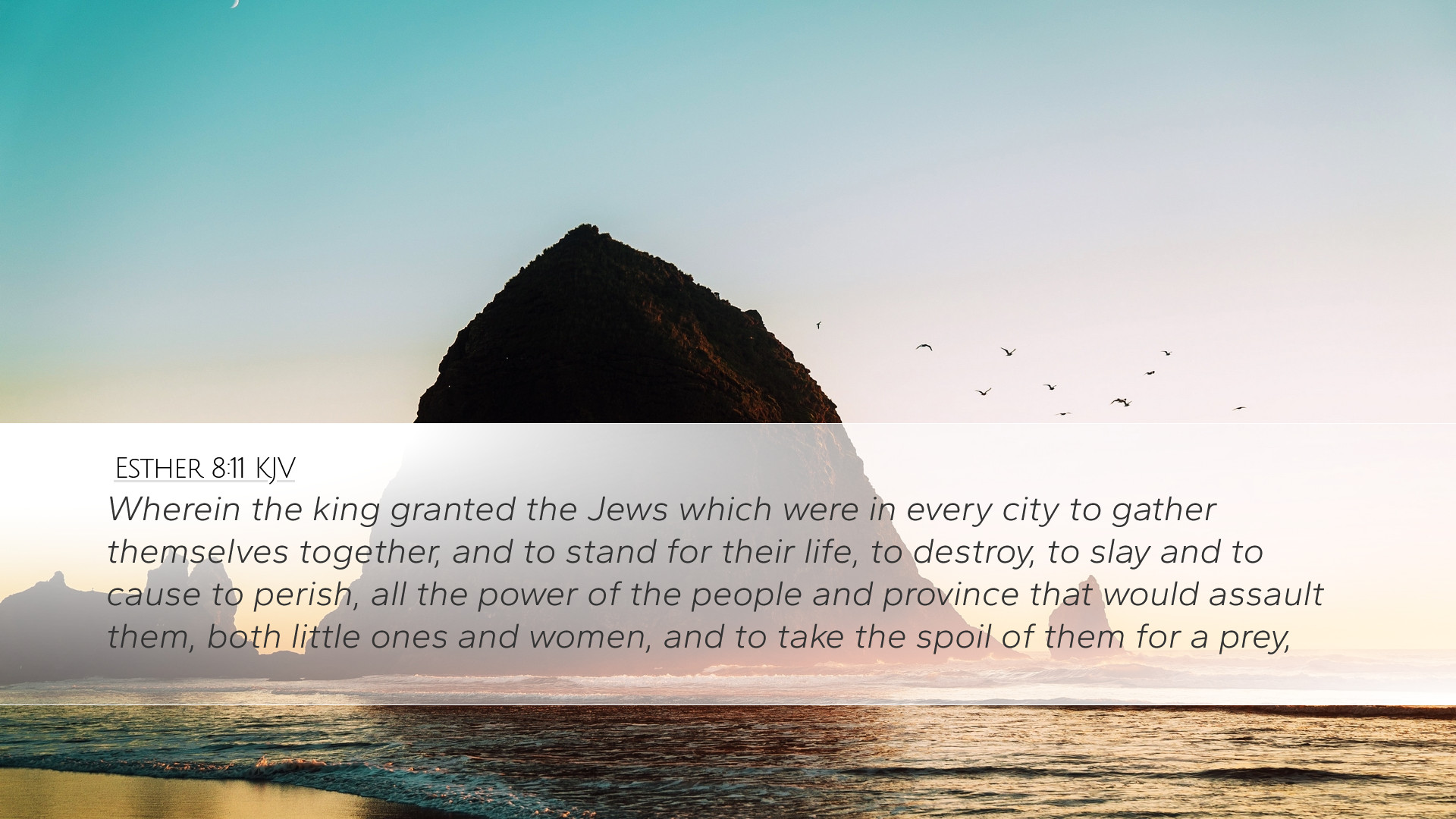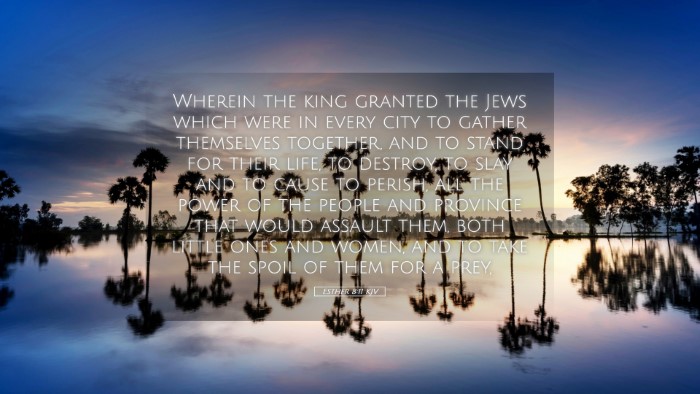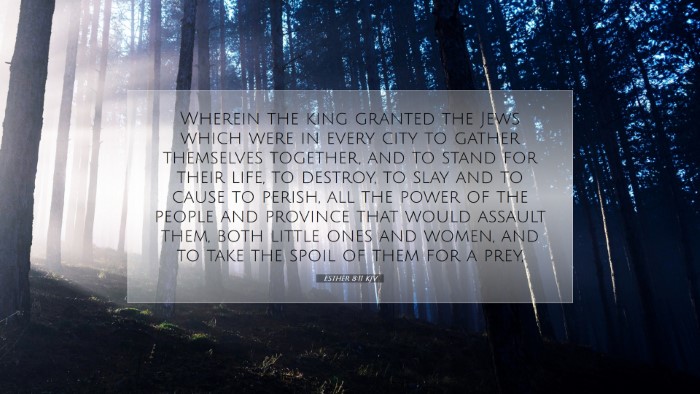Old Testament
Genesis Exodus Leviticus Numbers Deuteronomy Joshua Judges Ruth 1 Samuel 2 Samuel 1 Kings 2 Kings 1 Chronicles 2 Chronicles Ezra Nehemiah Esther Job Psalms Proverbs Ecclesiastes Song of Solomon Isaiah Jeremiah Lamentations Ezekiel Daniel Hosea Joel Amos Obadiah Jonah Micah Nahum Habakkuk Zephaniah Haggai Zechariah MalachiEsther 8:11
Esther 8:11 KJV
Wherein the king granted the Jews which were in every city to gather themselves together, and to stand for their life, to destroy, to slay and to cause to perish, all the power of the people and province that would assault them, both little ones and women, and to take the spoil of them for a prey,
Esther 8:11 Bible Commentary
Commentary on Esther 8:11
Verse: "By these letters the king permitted the Jews who were in every city to gather and to defend their lives, to destroy, to kill, and to annihilate all the forces of any people or province that would assault them, both little children and women, and to plunder their possessions," (Esther 8:11, NKJV).
Introduction
This verse from the Book of Esther marks a pivotal moment in the narrative, showcasing the turning tide for the Jewish people. After the plot against them, facilitated by Haman, the king's decree allows the Jews to defend themselves against their enemies. This empowers them and suggests themes of divine justice and vindication.
Contextual Background
The historical backdrop of Esther is critical to understanding the significance of this verse. The Jewish people faced existential threats in the Persian Empire due to Haman’s edict for their destruction. Esther's rise to prominence as queen and her advocacy for her people leads to the king's decree. This moment is steeped in the providence of God, who orchestrates events for the protection of His people.
Exegesis and Analysis
1. The Nature of the Decree
The decree in this verse is significant for its legal authority; it gives the Jews the right to defend themselves against any aggressor. According to Matthew Henry's Commentary, this decree serves as a "royal grant" that not only legitimizes their right to self-defense but also emphasizes God's providence in changing the hearts of rulers.
2. The Elements of the Defense
The defense permitted by the king includes "to destroy, to kill, and to annihilate." This language illustrates the severity of the threat faced by the Jewish community. As Albert Barnes points out, the permission to take action against enemies is indicative of the seriousness of Haman's initial decree and the subsequent urgency for Jewish survival.
3. The Ethical Implications
This passage raises ethical questions regarding violence and self-defense within a biblical framework. Adam Clarke elucidates that while self-defense is sanctioned, the overarching theme is one of justice rather than revenge. The Jewish people's response is a direct reaction to an unjust decree against them, indicating a defense of their rights and lives.
4. Family and Community Preservation
The specification concerning "both little children and women" highlights the comprehensive nature of the threat and the necessity of safeguarding families. The Jewish community is portrayed not only as individuals but as a collective entity vital to the covenantal community God established. As noted by Matthew Henry, this also reflects God's heart for the vulnerable in society.
5. The Right to Plunder
Additionally, the mention of "to plunder their possessions" can be seen through the lens of justice and recompense. Albert Barnes suggests that this provision was a means for the oppressed to reclaim what had been wrongfully taken from them, thus restoring balance after the initial injustice initiated by Haman.
Theological Reflections
1. Divine Justice
This verse serves as a testament to the justice of God, who champions the cause of the oppressed. The sudden shift from decree of death to one of protection is a powerful illustration of God's ability to overturn circumstances for His people. Clarke mentions this as a hallmark of God's intervention in history.
2. The Role of Providence
Esther 8:11 encapsulates the theme of divine providence operating in human affairs. The king’s unexpected support signifies God’s hand at work, orchestrating events for the good of His covenant people. This narrative encourages believers to trust in God’s ultimate control despite the present darkness.
Application for Today
For pastors, students, and theologians today, Esther 8:11 offers profound lessons on faith, justice, and the sovereignty of God. The ability to stand firm against oppression and injustice is a theme that resonates in contemporary contexts, encouraging believers to advocate for those who are marginalized. The verse invites reflection on the nature of power—how it can be wielded for good or ill—and challenges modern followers of Christ to align themselves with God's justice.
Conclusion
Esther 8:11 is not merely a historical account; it is a reminder of God's unyielding commitment to His people. It embodies the hope that arises even in dire circumstances and compels believers to engage with the world around them through the lens of faith, justice, and the expectation of divine intervention. As they navigate their spiritual journeys, this verse serves as a call to action—encouraging them to seek justice and exhibit courage in the face of adversity.


